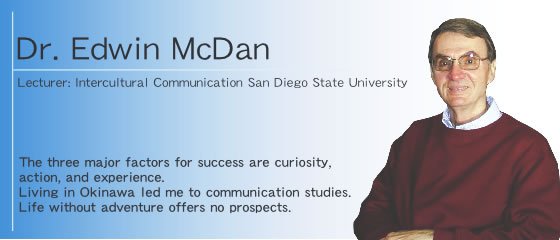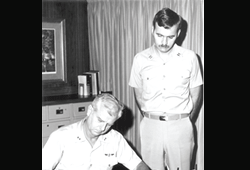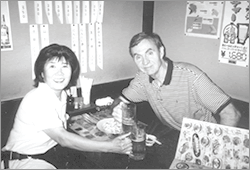YuYu interview Edwin McDaniel
 |
| —— You have studied “Japanese negotiation behaviors”, what are the characteristics of the Japanese communication style? I studied speech communication in graduate school at Arizona State University. The emphasis of my dissertation was "how culture influences the style of communication in Japanese companies." The reason why I became interested in this area was that I'd seen cultural differences cause problems when Japanese and Americans were trying to do business with each other. Especially, since I often heard that Americans became frustrated because they didn't understand the Japanese way of doing business. So, I requested interviews with Japanese corporate executives, and then elucidated the typical characteristics of Japanese business people. The project took me two years to complete. One of the tendencies that I've observed is that in the planning stages Japanese tend to collect more information than American businessmen or ask the same questions again and again. Another is that they often want to discuss the issues again and again when Americans believe those Issues have already been settled. In other words, Japanese want extremely detailed information. The reason behind this is the Japanese business persons view of : "Fully understanding issues related to my work and being prepared to answer to all possible questions will help me protect myself, my co-workers, and my company." Meanwhile, Americans tend to think that a long meeting reflects inefficiency and is a waste of time. The Japanese quest for "detail and accuracy" and the American view of looking for "outline and conciseness" clash, can generate distrust and misunderstandings of each other. A person's cultural background determines how he or she acts and thinks. Thus, when negotiating with someone, it is necessary to understand the cultural characteristics of each person's country. Another topic of my studies was "The influence of information technology development on Japanese corporate communication." Nowadays, communicating via email is a core business activity for Japanese, too. As a result, "nemawashi (laying the groundwork)," a uniquely Japanese expression, is becoming less pronounced. The Japanese have traditionally used an indirect communication style, but in communicating via email, you can't read the other person's nonverbal communication behaviors, such as facial expressions. That's why today's Japanese business people often say "yes" or "no" more clearly than in the past. At the same time, another example of typical Japanese behavior-giving vague responses while checking the other person's expressions-is seen less today among the younger generation. I conducted a study of IT influences in Japan and presented the results at an academic conference that took place in Miami in November 2003. I hope the results will be published in a business book or a textbook for students someday. I'll be happy if my findings help those who are considering starting a business in the international arena. 
Working with his grandfather picking cotton
in Texas, 1949 I grew up in a small town in Texas. It was a farming community with a population of about 650 people. My father was engaged in oil field development in Saudi Arabia and South America and was often there. So I grew up helping my grandfather in Texas growing cotton, corn and taking care of cattle. Back then, I was thinking about becoming a cattle rancher or a veterinarian. It was such a small community that there was nothing but agriculture to Interest me. So, I went to Texas A&M University and majored in Agriculture. However, this was during the Vietnam War so men eighteen or older were being drafted into military service and I was going to be drafted into the Army upon graduating from college. I had a dream of becoming a cattle rancher or a veterinarian, and at the same time a desire to serve my country. But, rather than being drafted into the Army, I thought I'd rather serve on an aircraft or a ship. So, I volunteered to join the Navy the year before graduating. Then I graduated, and was soon ordered to go to Vietnam. I decided to accept the reality I was now facing as it was and deal with it positively, rather than worrying about the future. The Vietnam War-I can say this served as a turning point in my life. Before that I had focused only on agriculture, so military life was a completely new experience for me. As I made friends with many people all over the world, my life's path changed 180 degrees. 
As a naval intelligence liaison officer in Quang Ngai, South Vietnam, 1969
In Vietnam, I was assigned to work with the Army and Marines as an intelligence liaison officer. The situation there in those days was exactly the same as the one taking place in the war in Iraq. I was determined to do my duty, but was always tensed up, sensing the danger that surrounded me. I saw friends killed and that forced me to think about the way I valued life, something I'd never given much thought to before while living peacefully back home. After finishing my Vietnam tour of duty, I worked as a Naval Intelligence Officer and traveled to many Asian and European countries. My main job was to monitor Soviet and Chinese activities and report my findings to the US government. This experience motivated me to pay attention to world events, so I became more interested in international affairs, including diplomacy between governments and a variety of related aspects such as culture, worldview, and behavior. Serving in the military widened my outlook tremendously. In the military, I had a plenty of opportunities to speak in front of people and I believe this experience helped me tremendously in my teaching career. One's life is built through meeting people and their range of experiences. What you've experienced may help you after many years in a way that you never expected. You may not have a clear vision of the future right now, but efforts and experience will never be wasted. If I had not entered the military after graduating from college, I would have probably pursued a career in agriculture in Texas. Of course, it wouldn't have been bad, but on the other hand, I would have never been exposed to or been interested in anything other than agriculture. My world would have been much smaller and I would never have met such a variety of people. 
Sailing the Pacific near Okinawa as an intelligence officer on an Navy staff in 1972.
When I was stationed in Okinawa, I was impressed by the Japanese people's kindness. While making friends with many Japanese, I became interested in Japanese culture. Then, my eagerness to learn about it never stopped. Starting with the observation of Japanese commuting hours, I conducted a thorough study of various aspects of Japanese culture, including communication styles, IT systems, clothing, food, onsen (hot springs), buildings, and etiquette. It's a study that I'll continue as long as I live. It is important to learn about a country's culture to deepen the connection with that country's people. This understanding is especially useful when trying to resolve business differences between companies from different countries. This Information is indispensable in understanding each other's cultural characteristics, including communication styles. This is an aside, but I met my wife Noriko in San Diego. She helps me understand Japanese culture a lot. We go to Japan together once a year, checking out developments in technology, changes and trends. Japanese culture is profound. I learn more and more about Japan and it's still an intriguing country for me. —— What made you choose to teach? After retiring from the Navy, I wanted to learn more about Japan, so I entered graduate school at Arizona State University, where I majored in intercultural communication and earned my Ph.D. After that, I served as the Executive Coordinator of the Japan-U.S. Telecommunications Research Institute for one year. Unexpectedly, I was asked by San Diego State University to teach some courses. Because I'd never expected that I would teach, I was at first very surprised. Yet, I understood that in life it is always important to think positively and move forward. I gladly accepted the opportunity that seemed to have appeared out of the blue. When you take a new step, you meet new people. I currently teach intercultural communication theories and other courses that relate to intercultural communication. I also teach an anthropology course on Japanese society at San Diego State University. I feel honored to see what I studied for such a long time in Japan being put to use in this way. In order to teach, you must have the willingness to meet new challenges, because to interest your students, you always have to be innovative in teaching classes. For example, in my Japanese society class, I have my students watch Japanese movies and write papers on Japanese culture. During the Spring semester, we watched "Shall we dance?" directed by Masayuki Suo and had an exciting discussion. The students are highly interested in Japan, which always impresses me. At the same time, I need to be well prepared to answer to their questions. Whenever I see students actively participating in class and eagerly trying to learn, it reminds me that we as educators have important responsibilities. I've learned from my students how I am supposed to be as an educator. 
Dr. McDaniel and his wife Noriko in a Shibuya restaurant in 2002
My grandfather and father. My grandfather ran a farm and my father worked in the oil fields. I learned from both of them the importance of studying and specializing in one area. The reason why I immerse myself as a scholar in the study of Japanese culture is that I remember my grandfather and father working hard in their areas. In addition, I learned from my grandfather the importance of respecting others. In those days, African Americans were hired to work on his farm. My grandfather was always considerate, respectful and treated everyone fairly, so he was liked and admired. He wasn't particularly well-off, but even as a boy, I was able to see that he was happy in his profession. The reason why I became extensively interested in other countries' cultures and views, especially Japanese culture, was that I understood the true meaning of "respecting others" from the bottom of my heart. Another person who influenced my life is Larry Samovar, a retired SDSU professor, who taught intercultural communication. I met him when I took his class as a student at SDSU. All the topics of the class greatly interested me. I believe what I learned from his intercultural communication class still lives on in my own class. 
On a visit to Nikko, 2001
I'll continue to teach at SDSU for a while, but after I retire, I'd like to buy a home in Japan so that Noriko and I can live part-time in San Diego and part-time in Japan. After I realize that dream, I have two dreams for my life in Japan. One is to teach part-time at a college in Japan. There, I'd like to use my experience in teaching communication at an American university. "Communication" is broad in scope, but my focus is on the difference between Japanese and American communication styles that is caused by cultural differences between the two countries. I'd like to teach such topics to Japanese students. I believe it would be useful for those young students who will someday work in international business. Another dream is to work as a business consultant and serve as a bridge between Japan and the United States. Through my studies, I've seen many times that Japanese and American companies are not successful in negotiating with each other, even though they make themselves understood. The problem occurs when the two parties have culturally based communication styles that differ from each other. On such occasions, I'd like, as a business consultant, to help them negotiate smoothly. When a communication problem or misunderstanding occurs, I can give impartial advice from both sides' point of view. If it helps both parties negotiate successfully, I will be happy. —— What is your motto in life? "Be a self-starter." In other words, "Do things on your own initiative." People in America often say this, but the key to success in life is to use your initiative and start something yourself, rather than wait for someone to tell you what to do or wait for something to happen to you. The reason why I've been able experience so much and live a fruitful life is that I've always taken the Initiative and worked hard. I am very satisfied with the way I've lived according to this motto. I'd like to actively keep pursuing my dreams. (09-01-2004 issue) |

